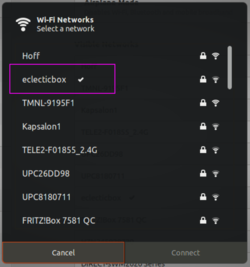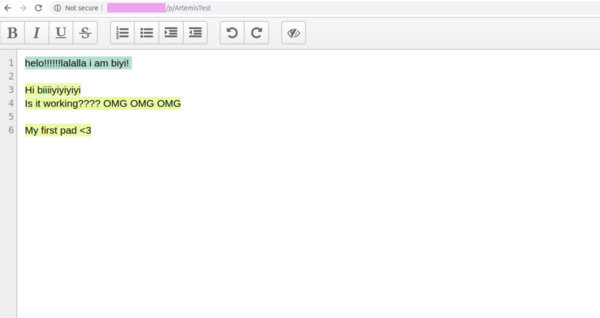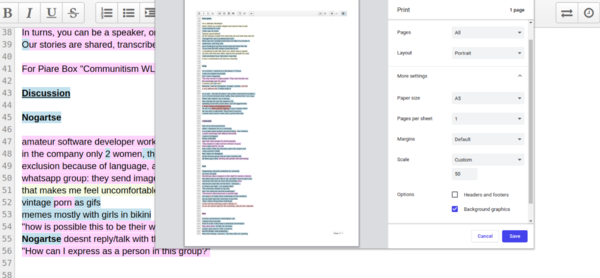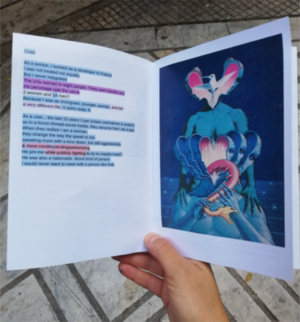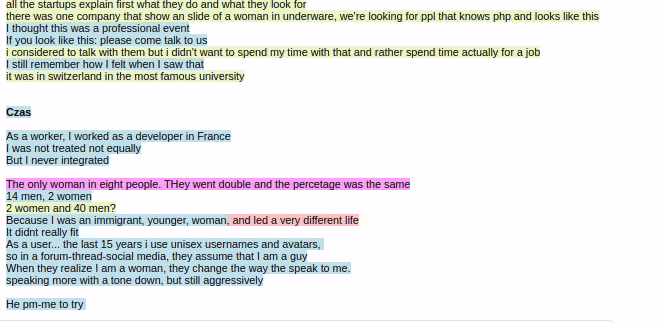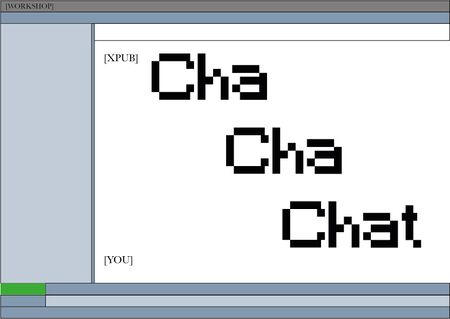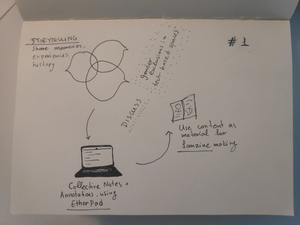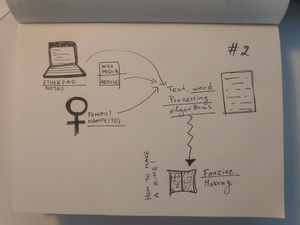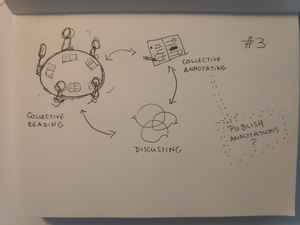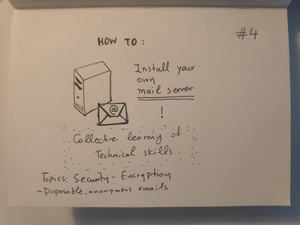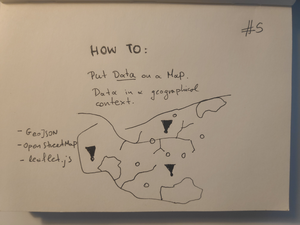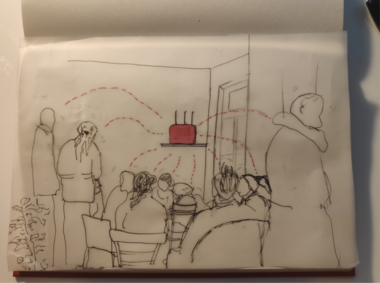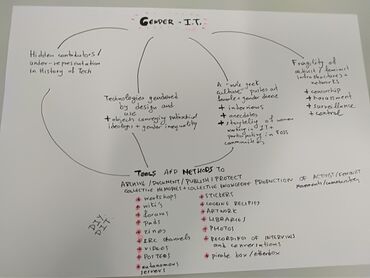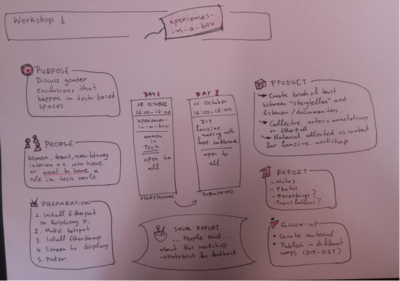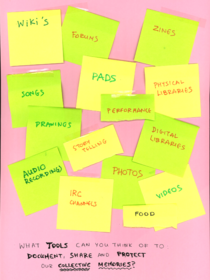User:Artemis gryllaki/GradPrototyping
Hack Pact
#H1_Setting up a Raspberry Pi as a Wireless Access Point
For this step, I used the guide from Networks Of Ones Own, on How to build your own etherbox!
Build-your-own-etherbox
- Install and setup Raspbian Lite on Raspberry Pi 3
- Enable SSH
- Setup hotspot
- Assign a static IP address to the Pi
#H2_Install Etherpad on Raspberry Pi
- I installed Etherpad on my Raspberry Pi, in order to use it for collaborative real-time writing and editing.
#H3_Document a session of story-sharing and discussion using Etherpad
- People in a feminist hack meeting want to preserve their anonymity, so for documenting a collective discussion a tool like Etherpad is preferred, instead of audio/video recordings. The real-time, multi-authorship editing helped in correcting mistakes, adding notes from different people simultaneously.
- Notes from the Etherpad were exported in PDF format, using Ctrl+p in Chrome, with the option "Background graphics" enabled, in order to keep authorship colours.
#H4_Fanzine making using Inkscape and Scribus
- Inkscape used to crop the pdf in smaller pieces (short stories), so they could be used in the layout later.
- FTP server a Raspberry Pi to share images/sketches/photos, that can be used in the layout.
- Scribus used to create a basic layout from the images selected in the FTP server, and the cropped short stories from the Etherpad. Export the file in A4 pdf.
- Print fanzine!
#H5_Create PDF booklet using a script
- A recipe that turned the A4 pdf into a ready-to-print booklet: https://gitlab.constantvzw.org/zine-machines/workshop-scripts/tree/master/booklet
#H6_Gif making to capture the process collective writing in Etherpad
- Peek used for screen-recording and GIF-making.
- Gifsicle to edit the GIF, for example, to resize and optimise it.
Py.rate.chnic Sessions!
Cha Cha Chat
Rita & Artemis
In this workshop, we will look into alternative tools for communicating online, by experimenting with a locally installed chat-software. Through this process, we will talk about the issue and appeal of popular chat applications.
We don't claim that there is an ideal instant-messaging tool to serve everyone's interest. Rather, we aim to discuss how distinct tools can fit different contexts and circumstances. What situations demand the use of alternative communication tools, and why is it useful to try them?
Join us and let's chat using our own network!
Title
Cha Cha Chat: Chat about Chat, through an Internet Relay Chat :-)
Who is leading the workshop
Rita & Artemis
Format
Workshop
Key topics
Chat protocols, social media platforms, social aspects of networks
Short description
Relevance to our own research.
(Artemis) My research focuses on feminist hack & tech initiatives. I have observed that activist and feminist communities primarily choose alternative/self-hosted/non-commercial tools for their everyday communication. An interesting case is that of the Internet Relay Chat. “Why these contemporary user groups – widely considered as disruptive innovators and early adopters – stick to a museological chat technology despite its obvious limitations within the current technological landscape?” (Maxigas, 2017). While practically testing an unpopular instant-messaging tool like IRC within a group, I want to discuss how this choice is useful and/or important for participants in feminist hackerspaces. What attitude towards technology does it propose and what comment does it make on the fallacies of mainstream social media.
(Rita) For me is about amplifying strategies on social media to research and practice agency. The exercise of several actions and people demonstrate a wish for users to be heard and stay in control. One of these movements is decentralised networks, such as the IRC chat we will use today.
What will happen
In this workshop we will:
- Talk about alternative chat protocols. Which ones do we already know? What chat/apps/platforms do we use every day?
- Provide printed instructions for the tool we'll use and a list of existing tools to explore later.
- Build and/or try basic chat tools (e.g command-line, basic local network to share ip, python, IRC etc); activities e.g. Create ASCII nickname etc.
- Discuss these tools. Compare to mainstream chat apps we use every day; potential, purposes (education, awareness, experiment, privacy issues etc) We will have prepared questions to guide the conversation, especially important if the group has little experience with the topic.
- Use the chat as a documentation tool to document the discussion.
- Have a printer connected to our local network to directly print that is being written in the chat. (e.g. dot-matrix) Or save it first and then print.
Why (relevance)?
- Get our audience to know chat protocols, apps and platforms besides the mainstream ones.
- Give and receive input about chat applications in our lives.
- Experiment with low-tech or alternative ways of creating/using chat tools.
- Open up discussions about why alternative tools exist, e.g. for privacy, surveillance, self-education, gain agency with technology, autonomous communication.
- Discuss for whom is this useful and/or important.
Outcome: what will be goal of the session?
We will use the tested chat tool to document and publish our discussion. We will save the chat logs in a text file, and instantly print it using a printer connected to our network.
maximum amount of participants
10
Prerequisites: reading list, software installs, material to bring
Computers from school? In this case, software could already be installed. Do participants bring laptops?
Communication, archiving & publishing, in feminist hack initiatives
IRC
XMPP
Δchat
GNU Mailman
Mastodon
Wiki
Etherpad
Nextcloud
Inkscape, GIMP, ImageMagick
Feminist server
+++
Sketches and Drafts
Ideas for workshops
https://pad.xpub.nl/p/Py.rate.chnic_Artemis
It contains Etherpad, where collective notes can be documented simultaneously.
Collective notes and annotations from the pad can become material to create small publications. (e.g. fanzines)

